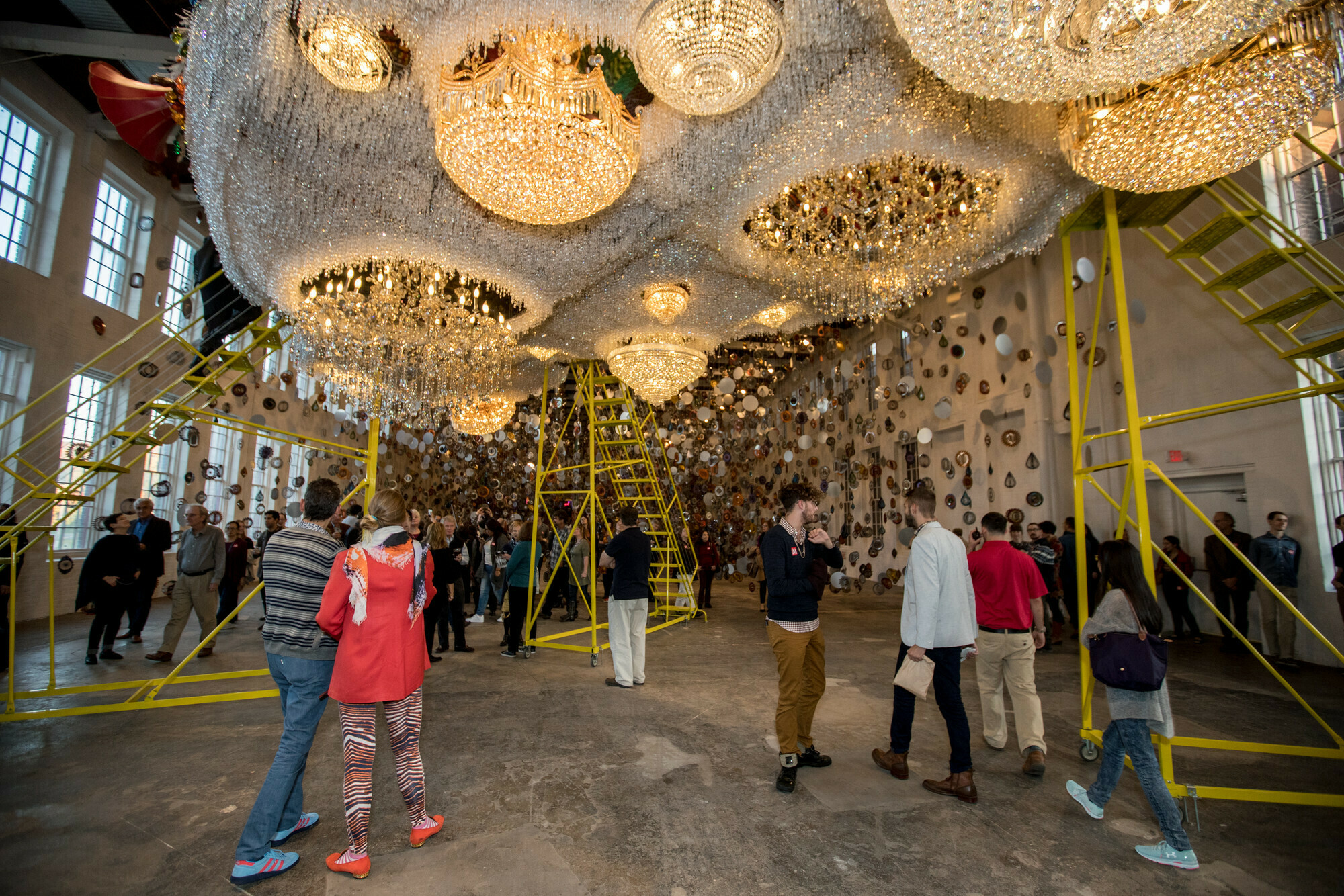This year alone, Chicago has suffered more than 900 incidents of gun violence, the artist Nick Cave told me in a recent interview. “We read about what’s going on in these communities, but we choose to be disconnected, to shun ourselves from it,” Cave said. His latest exhibition is a visual response to the epidemic of gun violence that is too big and too bright to ignore. Titled “Until,” it is an epic, multi-part installation that sprawls out through a massive hall at MASS MoCA in North Adams, Massachusetts.
The installation is a series of environments made up of a vast array of colorful tchotchkes, from a cloudscape of crystals interspersed with hanging chandeliers and dozens of traditional “lawn jockeys” to a faux garden bedecked with 16,000 wind spinners and thousands of ceramic birds, fruits, and animals amid images of guns and teardrops. Cave has described the experience of navigating the show as akin to being inside the belly of one of his Soundsuits, the colorful full-body garments he first made in 1992 as a response to the public beating of Rodney King by Los Angeles police officers. Cave saw the colorful full-body garments as statements and shields against the brutality inflicted on black bodies in the United States.
More than two decades later, he decided that the Soundsuits are no longer enough. Violence continues to afflict communities of color, and the need to confront this issue more directly, he said, has intensified.
“I’m interested in calling out this state of urgency,” Cave said, “as an African American, as a citizen of the U.S., as a resident of Chicago. I’m interested in the history that is being recorded and the response to that.”
“Until” is Cave’s way to manifest his sense of emergency through sheer scale. “I wanted to open the show with this sensation of something extraordinary and magical and beautiful and yet, once you realize what you’re looking at you’re like, ‘not so pretty,’ ” the artist said. The exhibition’s images of targets, guns, and teardrops are meant to illicit a discomfort in viewers—and, through that, instigate a kind of confrontation.
Critical to that dynamic is Cave’s intention to create a space where collective members of society—from “civic leaders and police commissioners to parents and their children”—can come together to share “difficult conversations” about issues facing their communities. In that way, Cave said, “Until” is an attempt to change the “social economic diversity of MASS MoCA” by creating “another way in which we think of town hall gatherings.”
A number of collaborators tapped by Cave are using the space in unusual ways. In Until, a book about the project recently published by Prestel, the poet Carl Hancock Rux recalls one such moment when a group broke out into an impromptu gospel-style performance of the Sam Cook song “A Change Is Gonna Come.” It’s worth recounting the details in full: “Like Antigone burying the body of her brother Polynices against the orders of Creon’s edict,” Rux writes, “Brenda Wimberly asked Serena Henderson to play the piano that happened to stand isolated against a bare wall . . . Sitting on the floor, I joined Helga Davis and Solange—organized as a spontaneous Chorus—in supporting Wimberly’s solo, harmonizing the word ‘change’ as Bill T. Jones improvised dance of the blind prophet come to testify to the displeasure and hope of the gods.”
Cave sees these sort of improvised moments—which will continue in transplanted spaces when “Until” travels to its two co-commissioning venues of Carriageworks in Sydney, Australia, and Crystal Bridges Museum of American Art in Arkansas—as responses to the challenge of creating work that is accessible while also amplifying “a political overtone.” The key, explained Cave, is to create work “that seduces and pulls you in” while delivering the hard truths it is trying to communicate.
“At the end of the day, I’d like to talk about other things,” said Cave, somewhat exasperated that he’s still responding to the same grim realities that prompted his first Soundsuit. “I’m sort of like, ‘OK, I just have to find ways of doing that in spite of what’s emotionally affecting me. It’s a lot to have to juggle,” he said—“and, at the same time, having to make it all fucking fierce.”



Comment here